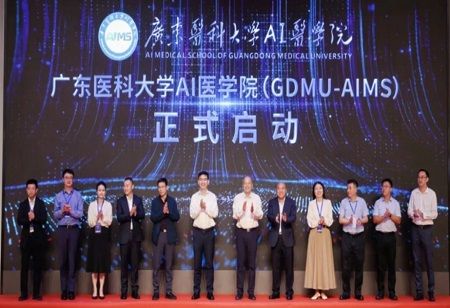- Guangdong Medical University inaugurates China’s first AI Medical School in Zhanjiang, aiming to train future doctors in AI-driven healthcare with advanced tools like digital twins, VR, and HarmonyOS-based platforms.
- The initiative brings together over 30 AI models and 20 ecosystem partners to create real-world medical application scenarios and boost AI literacy across clinical research, diagnostics, and education.
- The school reflects China’s growing emphasis on AI-integrated medical education, with similar institutions emerging at Shanghai Jiao Tong and Tongji Universities, signaling a national shift in healthcare innovation.
Guangdong Medical University has opened what it claims is China's first artificial intelligence medical school, designed to deliver high-quality students while embracing change in training those in the medical field during the age of AI.
Lu Jinghui, the secretary and president of the Guangdong Medical University, added that the initiative would contribute to the construction of open-source medical education application scenarios for domestic medical AI models and provide support for developing AI literacy in knowledge learning, clinical research, and diagnosis and treatment during students' development from campus to hospital.
"It will enable students with the professional skills they need to keep pace with future medicine and intelligent healthcare under the power of AI," Lu said.
The ceremony was on Sunday at the university's campus in Zhanjiang, a seaside city in western Guangdong province, and it attracted experts, scholars, as well as delegates from over 100 universities, research institutions, and AI firms.
The AI Medical School model was created online based on a HarmonyOS-powered ecosystem medical intelligent computing center that combines virtual and real worlds, and software and hardware. The center employed AI, virtual reality, digital twin, and metaverse technologies to develop an AI medical education platform, offering application scenarios for new-generation medical AI models.
Hou Fanfan, a Chinese Academy of Sciences and World Academy of Sciences academician tasked with promoting science development in developing nations, stated AI, particularly large-model technology, is currently being quickly incorporated into medicine.
"The establishment of the AI Medical School reflects a new vision and model, building and integrating different general and specialized models in cyberspace and offering new scenarios for applications of medical education", Hou said.
Yi Xuefeng, deputy director of the Guangdong Provincial Health Commission, stated that the initiative would facilitate two-way empowerment between medical education and AI, offering high-quality resources and practical platforms for medical staff, teachers, and students.
"Guangdong Medical University is actively seeking new modes of future medical education by leading the way with this platform, which combines virtual-real fusion and software-hardware synergy for medical education, research, and applications", Yi said.
The school has launched a lineup of medical AI large-scale models and data resources in cooperation with AI enterprises as ecosystem partners. The first batch comprises over 30 general, industry, and scenario-specific AI models in the medical sector, quality data resources, 100 renowned teachers and physicians, and over 20 ecosystem partners.
"AI capability and literacy will be the key competitiveness of doctors in the future", vice-president of Guangdong Medical University Zeng Zhirong said, adding that AI technology is transforming healthcare and ushering in new waves in medical education and clinical practice.
Based in the Leizhou Peninsula, Guangdong Medical University plays a significant role in Guangdong, which is an innovation and manufacturing hub of the world.
A number of other Chinese universities are also welcoming the future of AI in medicine. On June 27, the Shanghai Jiao Tong University's School of Medicine officially established its Institute of Medical Artificial Intelligence. Tongji University hosted a conference on AI empowering disciplinary innovation on May 20, when it opened its Medical Artificial Intelligence Institute.

